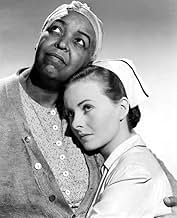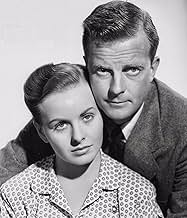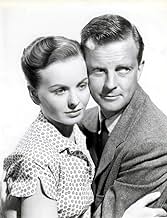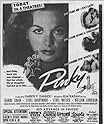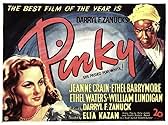AVALIAÇÃO DA IMDb
7,2/10
3,6 mil
SUA AVALIAÇÃO
Uma mulher negra de pele clara se apaixona por um médico branco, embora ele não saiba da sua verdadeira raça.Uma mulher negra de pele clara se apaixona por um médico branco, embora ele não saiba da sua verdadeira raça.Uma mulher negra de pele clara se apaixona por um médico branco, embora ele não saiba da sua verdadeira raça.
- Direção
- Roteiristas
- Artistas
- Indicado a 3 Oscars
- 3 vitórias e 4 indicações no total
Fred Aldrich
- Townsman
- (não creditado)
Shelby Bacon
- Boy
- (não creditado)
Betty Beard
- Minor Role
- (não creditado)
Rene Beard
- Teejore
- (não creditado)
Arthur Berkeley
- Townsman
- (não creditado)
Patsy Boniface
- Minor Role
- (não creditado)
Mildred Boyd
- Nurse
- (não creditado)
Avaliações em destaque
It is not very "in" to like Elia Kazan right now, because he named names in the McCarthy witch-hunts and just received an honorary Oscar, but what a brilliant director he was. And if he didn't show much courage in the Fifties, he sure did in the Forties when he tackled racial prejudice head-on in two excellent movies: "Gentleman's Agreement" and "Pinky" (John Ford is said to have chickened-out of directing this one). "Pinky" is not as good as "Gentleman's Agreement", but it ain't half bad either. Here we see a deeply prejudiced South where black girls are attacked on the streets and shops refuse them service. The scenes are realistic, even brutally filmed, and the language strong for its day.
I'm sure Kazan must have been dismayed to have been given a Hollywood starlet to play the complex lead character - a black woman who looks white - but he managed to extract a damn good performance out of Jeanne Crain. The supporting cast is flawless, down to the smallest role. Kazan knew how to direct actors. Evelyn Varden deserves special mention as a vicious Southern matron. But the most praise must be reserved for the two Ethels - Waters and Barrymore - who are nothing short of brilliant.
Okay, the ending's a little dicky, and predictable, but the intentions of the film-makers are sincere and the results must have been revolutionary in 1949. I love the way Kazan shoots his movies too - long unbroken sequences and tracking shots, and excellent use of light and shadow - both of which probably coming from his stage experience. Kazan combined a strong ability to work with actors and a keen cinematic eye to create some of the best dramatic films of the century. And "Pinky" is one of these.
I'm sure Kazan must have been dismayed to have been given a Hollywood starlet to play the complex lead character - a black woman who looks white - but he managed to extract a damn good performance out of Jeanne Crain. The supporting cast is flawless, down to the smallest role. Kazan knew how to direct actors. Evelyn Varden deserves special mention as a vicious Southern matron. But the most praise must be reserved for the two Ethels - Waters and Barrymore - who are nothing short of brilliant.
Okay, the ending's a little dicky, and predictable, but the intentions of the film-makers are sincere and the results must have been revolutionary in 1949. I love the way Kazan shoots his movies too - long unbroken sequences and tracking shots, and excellent use of light and shadow - both of which probably coming from his stage experience. Kazan combined a strong ability to work with actors and a keen cinematic eye to create some of the best dramatic films of the century. And "Pinky" is one of these.
What was fascinating and groundbreaking in 1949 is now a bit old fashioned when it comes to the film Pinky. Like Guess Who's Coming To Dinner a generation later, 20th Century Fox and director Elia Kazan went as far as they could and not hurt the box office.
Remember after all even with 'message' pictures, people have to come to the theater to see and get the message.
If it were done 20 years later someone like Lena Horne would have been cast in the part of Pinky. It was the kind of role that Lena wanted to do at MGM, but they wouldn't give her, they wouldn't be that bold. Still I can't fault Jeanne Crain's performance which got her an Oscar nomination for Best Actress. She lost the Oscar sweepstakes to Olivia DeHavilland for The Heiress.
Crain as Pinky has come home to her southern town after many years of living in the north and passing for white with her light features. As she puts she started when a train conductor escorted to the white section of a train she was riding on back when she left to go to nursing school. Of course the news that she's done that is shocking to her grandmother Ethel Waters who raised her.
It's also a culture shock to Crain to come home and relearn segregated ways after living in the north. When Sammy Davis, Jr. wrote his autobiography Yes I Can he said he learned about racism for the first time in the army. Working in show business with his dad and uncle where he was a child performer like Michael Jackson was with his brothers he was insulated from the realities of the outside world. Show business was a cocoon for Davis just as passing was for Crain's Pinky character. She has some nasty incidents including one with Nina Mae McKinney who resents what she sees as high toned ways.
Still Crain through her grandmother accepts a position to be a nurse companion to grand dame Ethel Barrymore who owns quite a bit of property. Her family is the local gentry there and Barrymore is dying. When Barrymore dies she leaves her estate, house and land to Crain and that gets her blood relatives led by Norma Varden all bent out of joint and ready to contest the will.
Which sets the film up for a trial similar to the one in To Kill A Mockingbird although this is a civil matter. The result of which you'll have to see the film for.
Besides those already mentioned look for sterling performances by Basil Ruysdael as Crain's attorney, William Lundigan as a white doctor who has fallen for Pinky, and Griff Barnett as a sympathetic doctor.
The two Ethels, Barrymore and Waters, both received Oscar nominations for Best Supporting Actress. And as luck would have it Celeste Holm and Elsa Lanchester were also nominated in that same category for Come To The Stable. So with two double nominees for two pictures, Mercedes McCambridge went right up the middle and won for her performance in All The King's Men. Made easier of course by the fact that Mercedes was also in the Best Picture of 1949.
Pinky is both old fashioned and groundbreaking. We'd never see casting like this again, but at the same time we can applaud the courage and daring it took for 20th Century Fox to make this film and for Jeanne Crain who got her career role out of it.
Remember after all even with 'message' pictures, people have to come to the theater to see and get the message.
If it were done 20 years later someone like Lena Horne would have been cast in the part of Pinky. It was the kind of role that Lena wanted to do at MGM, but they wouldn't give her, they wouldn't be that bold. Still I can't fault Jeanne Crain's performance which got her an Oscar nomination for Best Actress. She lost the Oscar sweepstakes to Olivia DeHavilland for The Heiress.
Crain as Pinky has come home to her southern town after many years of living in the north and passing for white with her light features. As she puts she started when a train conductor escorted to the white section of a train she was riding on back when she left to go to nursing school. Of course the news that she's done that is shocking to her grandmother Ethel Waters who raised her.
It's also a culture shock to Crain to come home and relearn segregated ways after living in the north. When Sammy Davis, Jr. wrote his autobiography Yes I Can he said he learned about racism for the first time in the army. Working in show business with his dad and uncle where he was a child performer like Michael Jackson was with his brothers he was insulated from the realities of the outside world. Show business was a cocoon for Davis just as passing was for Crain's Pinky character. She has some nasty incidents including one with Nina Mae McKinney who resents what she sees as high toned ways.
Still Crain through her grandmother accepts a position to be a nurse companion to grand dame Ethel Barrymore who owns quite a bit of property. Her family is the local gentry there and Barrymore is dying. When Barrymore dies she leaves her estate, house and land to Crain and that gets her blood relatives led by Norma Varden all bent out of joint and ready to contest the will.
Which sets the film up for a trial similar to the one in To Kill A Mockingbird although this is a civil matter. The result of which you'll have to see the film for.
Besides those already mentioned look for sterling performances by Basil Ruysdael as Crain's attorney, William Lundigan as a white doctor who has fallen for Pinky, and Griff Barnett as a sympathetic doctor.
The two Ethels, Barrymore and Waters, both received Oscar nominations for Best Supporting Actress. And as luck would have it Celeste Holm and Elsa Lanchester were also nominated in that same category for Come To The Stable. So with two double nominees for two pictures, Mercedes McCambridge went right up the middle and won for her performance in All The King's Men. Made easier of course by the fact that Mercedes was also in the Best Picture of 1949.
Pinky is both old fashioned and groundbreaking. We'd never see casting like this again, but at the same time we can applaud the courage and daring it took for 20th Century Fox to make this film and for Jeanne Crain who got her career role out of it.
Black people "passing for white" was not a new topic for Hollywood in 1949. It was part of the plot of "Imitation of Life" in 1934, but in that film, an actual black actress, Fredi Washington, played the role of the young woman who "passes" in the white world. In 1949, there were two films dealing with this issue: "Pinky" and "Lost Boundaries," and in both cases, the black person was played by a white actor.
"Pinky" stars Jeanne Crain as Pinky Johnson, a black woman who looks white, so much so that she when she studies nursing in New York, she easily enters the white world and becomes involved with a white doctor who wants to marry her. Needing time to think over her situation, she returns home, which is a shack where her grandmother (Ethel Waters) lives in a black section of their southern town. There she is reminded of the prejudice and cruelty she left. When her grandmother asks her to care for an elderly white woman (Ethel Barrymore), hostility between patient and nurse leads to an uneasy bond.
This is a brilliant film all the way, magnificently directed by Elia Kazan and produced by Darryl F. Zanuck, who loved taking on these controversial social issues. The acting is superb: Jeanne Crain gives the best performance of her career as a woman who comes to grips with her true identity. She is so dignified as she walks through the town, soft-spoken yet strong, refusing to come down to the level of those around her. Ethel Barrymore is the elderly terminally ill woman Pinky reluctantly agrees to care for, and she nearly steals the movie with a no-nonsense performance. She's a woman set in her ways and opinions, but she's fair person who can see the human soul. It's probably the best drawn character in the film.
As a teen-aged fan of "Route 66," I can well remember the publicity around the show when Ethel Waters guest-starred. Of course white teens in the '60s had no idea of who she was or the circumstances of her life and career. Yet to this day I can remember her on that show. Forty years later, thankfully, I have an appreciation of her place in history and her work. Waters gives a powerful performance. Her character has accepted her lot in life but sacrifices everything so that her grandchild can have a better one. In her world, white men have the power, and you can clearly see her belief manifested in her courtroom demeanor.
The casting of Jeanne Crain is a sticking point here but not really when looked at in the context of the 1940s. Even with this casting, this is a bold movie, uncompromising in its depiction of white attitudes and racial slurs. It is just a pity that at the time of the filming, Fredi Washington was 45 years old and actually no longer in films. Washington looked so white that she was told by producers that if she would agree to "pass" and play white roles, she could have a career equal to that of Norma Shearer. She refused, and in order to play black women, she had to darken her skin. Lena Horne was deemed not white-looking enough. I suggest that the same is true for the beautiful Dorothy Dandridge. There may have been black actresses who looked white enough to play this role, but would anyone have answered such a casting call? Most importantly, "Pinky" would not have been made without Jeanne Crain, because Zanuck wanted her to do it, and it's a film that deserved making. The other sticking point in the film is Pinky's fiancée, a white doctor. His easy acceptance of her as black - and the fact that she kept it from him - is a weakness in the script. This was done perhaps to highlight that he wanted to her to continue to pass for white, therefore making it clear that Pinky has to the make the decision, but the scenario does not seem believable.
You can predict the ending of "Pinky," and despite complaints that it's a typically neat Hollywood one, I found it immensely satisfying as I found the entire experience of watching this truly classic film, "Pinky."
"Pinky" stars Jeanne Crain as Pinky Johnson, a black woman who looks white, so much so that she when she studies nursing in New York, she easily enters the white world and becomes involved with a white doctor who wants to marry her. Needing time to think over her situation, she returns home, which is a shack where her grandmother (Ethel Waters) lives in a black section of their southern town. There she is reminded of the prejudice and cruelty she left. When her grandmother asks her to care for an elderly white woman (Ethel Barrymore), hostility between patient and nurse leads to an uneasy bond.
This is a brilliant film all the way, magnificently directed by Elia Kazan and produced by Darryl F. Zanuck, who loved taking on these controversial social issues. The acting is superb: Jeanne Crain gives the best performance of her career as a woman who comes to grips with her true identity. She is so dignified as she walks through the town, soft-spoken yet strong, refusing to come down to the level of those around her. Ethel Barrymore is the elderly terminally ill woman Pinky reluctantly agrees to care for, and she nearly steals the movie with a no-nonsense performance. She's a woman set in her ways and opinions, but she's fair person who can see the human soul. It's probably the best drawn character in the film.
As a teen-aged fan of "Route 66," I can well remember the publicity around the show when Ethel Waters guest-starred. Of course white teens in the '60s had no idea of who she was or the circumstances of her life and career. Yet to this day I can remember her on that show. Forty years later, thankfully, I have an appreciation of her place in history and her work. Waters gives a powerful performance. Her character has accepted her lot in life but sacrifices everything so that her grandchild can have a better one. In her world, white men have the power, and you can clearly see her belief manifested in her courtroom demeanor.
The casting of Jeanne Crain is a sticking point here but not really when looked at in the context of the 1940s. Even with this casting, this is a bold movie, uncompromising in its depiction of white attitudes and racial slurs. It is just a pity that at the time of the filming, Fredi Washington was 45 years old and actually no longer in films. Washington looked so white that she was told by producers that if she would agree to "pass" and play white roles, she could have a career equal to that of Norma Shearer. She refused, and in order to play black women, she had to darken her skin. Lena Horne was deemed not white-looking enough. I suggest that the same is true for the beautiful Dorothy Dandridge. There may have been black actresses who looked white enough to play this role, but would anyone have answered such a casting call? Most importantly, "Pinky" would not have been made without Jeanne Crain, because Zanuck wanted her to do it, and it's a film that deserved making. The other sticking point in the film is Pinky's fiancée, a white doctor. His easy acceptance of her as black - and the fact that she kept it from him - is a weakness in the script. This was done perhaps to highlight that he wanted to her to continue to pass for white, therefore making it clear that Pinky has to the make the decision, but the scenario does not seem believable.
You can predict the ending of "Pinky," and despite complaints that it's a typically neat Hollywood one, I found it immensely satisfying as I found the entire experience of watching this truly classic film, "Pinky."
I've just seen this film for the 3rd time although I'm sure I hadn't seen it for at least 10 years. I had forgotten the depth and intensity of the prejudice displayed in the film. It is taking nothing away from Jeanne Craine's sensitive and beautiful performance to say that the star of the film is Ethel Waters - she is simply a magnificent presence throughout. It is one of those performances where every fibre of being is transmitted thru to the viewer - you cannot help but feel that the character is one of the strongest and bravest women ever shown on screen. Considering the shocking 1950's world of Amos and Andy and the in-every-sense-white-bread fiction world of Hollywood - Father Knows Best, The Donna Reed Show, etc - it is startling to see how movies so transcended the comfort-food level of TV and challenged audiences. This movie belongs, I believe, in the highest echelon of social commentary films - such as To Kill a Mockingbird, Gentlemen's Agreement. Absolute must see!!!
Elia Kazan took over the helm of PINKY when John Ford requested replacement as having no real interest in the story. He not only took over, but he did a superb job.
Personally, it took awhile for me to get over the idea of casting JEANNE CRAIN as a light-skinned black, but she does some of her best work here. Same can be said of Ethel Waters and Ethel Barrymore, and not surprisingly, all three actresses were nominated for Oscars. Undoubtedly, all benefited by Kazan's firm direction.
The story is essentially written to show the racial bigotry that existed (and still does) in many parts of the South. Without going into plot development, let's say the ending is a bit predictable, but the film still remains powerful and sensitive in its treatment of the subject matter.
In 1949, this was a daring film for Fox to make, risking the possibility of hurting the reputation of its most popular box-office star at that time, Jeanne Crain. But credit goes to Darryl F. Zanuck for permitting his studio to make films like THE SNAKE PIT and GENTLEMAN'S AGREEMENT, risky and controversial. The box-office results and critical acclaim justified the risk.
Well worth seeing, absorbing and sensitive.
Personally, it took awhile for me to get over the idea of casting JEANNE CRAIN as a light-skinned black, but she does some of her best work here. Same can be said of Ethel Waters and Ethel Barrymore, and not surprisingly, all three actresses were nominated for Oscars. Undoubtedly, all benefited by Kazan's firm direction.
The story is essentially written to show the racial bigotry that existed (and still does) in many parts of the South. Without going into plot development, let's say the ending is a bit predictable, but the film still remains powerful and sensitive in its treatment of the subject matter.
In 1949, this was a daring film for Fox to make, risking the possibility of hurting the reputation of its most popular box-office star at that time, Jeanne Crain. But credit goes to Darryl F. Zanuck for permitting his studio to make films like THE SNAKE PIT and GENTLEMAN'S AGREEMENT, risky and controversial. The box-office results and critical acclaim justified the risk.
Well worth seeing, absorbing and sensitive.
Você sabia?
- CuriosidadesJohn Ford was the original director of the film but after seeing dailies, Darryl F. Zanuck felt Ford wasn't connecting with the material. Zanuck called Elia Kazan in New York and asked him to take over the film. Kazan felt he owed Zanuck for his film career and agreed to do the movie without even looking at the script. He flew to Los Angeles and started filming the next Monday.
- Erros de gravaçãoWhen the white officer slaps Rozelia on the left side of her face, she mistakenly rubs the right side of her face.
- Citações
Pinky Johnson: I'm a Negro. I can't forget it, and I can't deny it. I can't pretend to be anything else, and I don't want to be anything else. Don't you see, Tom?
Dr. Thomas Adams: No, I don't.
Pinky Johnson: You can't live without pride.
- ConexõesFeatured in Biografias: Darryl F. Zanuck: 20th Century Filmmaker (1995)
Principais escolhas
Faça login para avaliar e ver a lista de recomendações personalizadas
- How long is Pinky?Fornecido pela Alexa
Detalhes
- Data de lançamento
- País de origem
- Idioma
- Também conhecido como
- A Negra Branca
- Locações de filme
- Empresa de produção
- Consulte mais créditos da empresa na IMDbPro
Bilheteria
- Faturamento bruto nos EUA e Canadá
- US$ 4.200.000
- Tempo de duração
- 1 h 42 min(102 min)
- Cor
- Proporção
- 1.37 : 1
Contribua para esta página
Sugerir uma alteração ou adicionar conteúdo ausente


